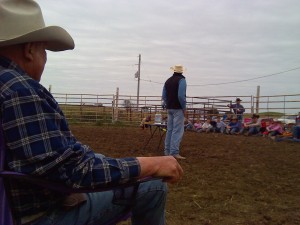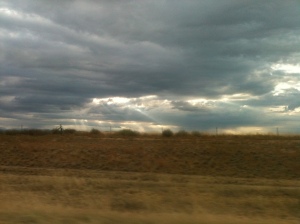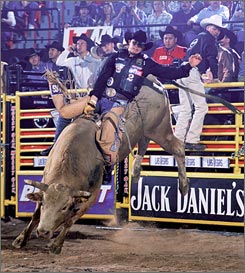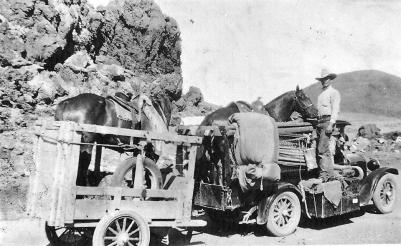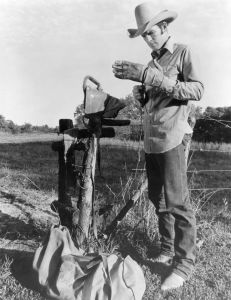
“The competition’s getting younger
Tougher broncs, you know I can’t recall
The worn out tape of Chris LeDoux, lonely women and bad booze
Seem to be the only friends I’ve left at all” — Garth Brooks, Much too Young
Songs for the road can be hard to come by. Chris Ledoux or King George are a safe bet. My favorite is Casey Donahew or The Brady Wilson Band. Between me, you and a fence post, Kelly Clarkson and Casadee Pope might make an appearance on my play list. Since King David preceded Chris Ledoux by a few years, and tape players, contrary to what many middle school students believe, were still a ways off, he was forced to write his own Songs for the Road.
Of the 14 Psalm titles that give contextual background, 6 of them are found in what I call “the fugitive narrative”. David is on the run from King Saul. He has finally convinced Jonathan that Saul wants him dead and then takes off. Like the “Rodeo Drifter” that Ledoux was, David writes his own songs about life as an outlaw.
Track 1: “The Ride”
“In God I trust; I will not be afraid; what can mortal man do to me?” (Ps. 56) goes the refrain of Psalm 56. David is in Gath, alone (1 Samuel 21.10-15). This is Philistine country, the birthplace of Goliath, and home of the sworn enemies of Israel. The songs of his triumphs have reached the ears of the Philistines as well. David was afraid [hb. yare’] of the King and what would he was capable of, so he pretended to be insane, drooling all over himself and coloring on the walls. While doing so, he wrote the song that is Psalm 56, where 3 times fear is brought up [hb. yare’]. In 3 instances, David sings that trust [hb. batach] will replace his fear. (v. 3, 4, 11) Specifically, David is trusting in the word [hb. dabar] of the Lord. While surrounded by enemies, in a foreign land, the only comfort David can find is in a song about trusting God’s word.
Track 2: “Photo Finish”
David probably thought sleeping in a cave was a thing of the past. Back when he was a shepherd boy it was ritual, but now he was the anointed King. This is where men on the run find themselves, in the dark recesses of the rocks. The prophet would later call it a “stronghold”, which that it was. It was a safe place, but he still felt vulnerable. Sleeping on cold stone will do that too you. But word had spread that he was hiding in the cave of Adullam (1 Sam 22.1-5) so at least he wasn’t alone now. Four hundred had gathered around him. The distressed, indebted, and discontent, flocked to him looking for a leader. There in the paradoxical-vulnerable-stronghold, David would start his song talking of refuge (Psalm 57.1) Refuge [hb. hasah] is spoken of in scripture as being found in 4 places: under trees (Jud. 9.15) and behind God’s shield (2 Sam 22.3, Ps.18.30). The other two are in rocks (Dt. 32.37; Ps. 18.2) and under the protective wings of God (Ruth 2.12). David, here, connects a metaphor and reality. While taking refuge in the rocks (1 Sam. 22), he is taking refuge in the shadow of God’s wings (Ps. 57.1). As he praises and sings this refrain repeats: “Be exalted, O God, above the heavens; let your glory be over all the earth.” (Psalm 57.5, 11) David will remain steadfast and he will continue to praise because of God’s mercy, love, and faithfulness. So God will be glorified all over the earth…even in this cave.
Track 3: “Unrecorded”
Not every song gets a melody. Sometimes the content or message can never be put to music. David just recorded a praise song in the cave, but he left another one dangling in his prayer journal. Psalm 57 was a praise hit, but Psalm 142 is a desperate cry for help. Maybe 142 was a little too heavy to find a melody for, a little too dark for air play. Certainly it didn’t have the upbeat feel that Psalm 57 did. Twice he cries out to the Lord (v. 1, 5). He is still in the cave, still in the refuge of the rocks (5), and crying out to God. Twice he mentions how weary he is (“my spirit grows faint” [3]; “I am in desperate need” [6]) and twice how men are after him (3,6). As he looks around, he wonders if anyone cares for his life or that he is confined to a cave (4,7). People do care…400 to be certain. (1 Samuel 22.2) “Then the righteous will gather about me because of your goodness to me.” (Psalm 142.7) He closes his journal and glances at the darkness descending outside the cave, the stronghold that has become his home.
Track 4: “It Ain’t the Years (it’s the miles).”
Following the advice of the prophet Gad, David took flight to the Judean desert. Moses went there to experience leadership and hear a call (Ex. 3); Elijah to think (1 Kings 19.4); Jesus to be tempted (Mark 4). It was in the desert [hb. midbar] where Israel learned to depend on God (Deut 8.2) for the little things and years later it is where David would meet with God in a song he would compose and record as Psalm 63. It depicts his current position and his physical distress comes out in spiritual language. He “thirsts” and “longs” for his Lord. His life is on the line, yet he desires love (3). Satisfaction never comes in a land that is constantly parched, but here he will be satisfied in God (5). In a land often forgotten, David will remember [zakar] the Lord and in a desert of constant peril, David rests in the “shadow of God’s wings” (6). The jackals of the desert that seek David’s life, will feast one day on the flesh of his seekers (9-10). In the wilderness, David understood that the love of his Lord would outlast this life that he lived. Despite the trials and sufferings that this life held, the love of God would outlast all. David’s been on the run for a while now and time doesn’t seem to be changing his position. It’s been a long road, but he knows the love of God still surrounds him.
Track 5: “Hard Years”
While David resided in the Desert of Judah, in the land of the of Ziphites, Saul was exhausting every means to root him out. The Ziphites did his job for him. They went to Saul and told him where David and his now 600 men were hiding. Saul told the Ziphites to keep a close eye on David (1 Samuel 23.19-23). David was “very crafty” [hb. ‘aram] which is a hebrew term that is seldom used in the Old Testament. It indicates that David has “learned a lesson.” David is not ignorant of Saul and his intentions. He knows what is going down. David pens Psalm 54 as Saul is just over the summit of the mountain. The words he uses show his pain: “vindicate” (1); “help” (4); “sustain” (4); “deliver” (7). But the way he uses them indicate his journey. Hebrew poetry is written in couples. Two lines are in relationship. They either negate one antoher, meaning the second line says the opposite of the first. They can build on each other, meaning the second line completes the first. Or they can compliment one another, meaning the second line says the same as the first. In Psalm 54 he uses the last one over and over. Save me and vindicate me, verse 1. God is my help and the Lord sustains me, verse 4. I will sacrifice and I will praise, verse 6. Delivered me from troubles and looked in triumph, verse 7. This song ends well. Sometimes a victory is all we need to change our tune. Certainly, David understood to whom the victory was attributed.
David’s time of running was complimented with songs. Like Ledoux, he wrote from experience, sometimes with tears staining the scrolls. David’s pain (and his triumph) is best communicated through song. But what came about during this fugitive time was more than just a great cd or soundtrack; this was a time of growth, that David would draw deeply from during his rule. A great song will take you back to an instant and experience so sit back and let the soundtrack communicate the wisdom gained during these years…and be thankful for the tune.
“Sit tall in the Saddle,
Hold your head up high.
Let your eyes fix
Where the trail meets the sky.
And live your life
Like you ain’t afraid to die.
Don’t be scared
And enjoy the ride.” —- Chris Ledoux, “The Ride”

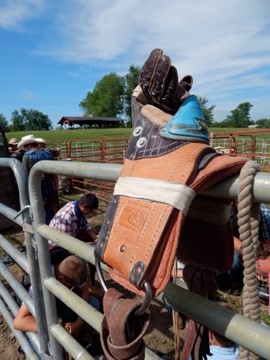 The most definitive sound in rodeo can be heard during the Bareback Riding. If you time it right, just in front of the chutes, amidst the sound of the clanging gates and exhaling broncs, a bareback rider will crack his bind.
The most definitive sound in rodeo can be heard during the Bareback Riding. If you time it right, just in front of the chutes, amidst the sound of the clanging gates and exhaling broncs, a bareback rider will crack his bind.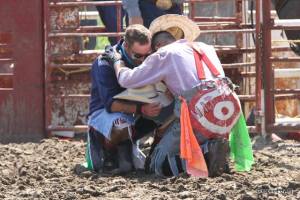 David and Jonathan were tied together through covenant. (1 Samuel 18.3-4)Much of life is based in a relationship that we would call: contract. I specify my demands and my desires in order for me to arrive at the deal that is in my best interest. Think of sports and the contracts involved there. Friendship (and marriage as well) is founded in a relationship called covenant. Covenants are entered for the betterment of the other party and unlike contracts, have no expiration date. Jonathan understood that his relationship with David would bring him very little in return. Jonathan was the next in line to be King, but his allegiance to David would mean the throne would never be his. So they made a covenant. When a covenant is made there is usually a sign or action that accompanies it. “Jonathan took off the robe he was wearing and gave it to David, along with his tunic, and even his sword, his bow and his belt.” (18.4) He renounces his identity as the next King as a sign of the covenant that he made with David. It reminds me of the story in Mark 2, where 4 men dug through a roof to get their paralyzed friend to Jesus. What’s in it for them? What do they have to gain? In contract, we gain; in covenant, we give. Who are you chained too right now that you would give anything for?
David and Jonathan were tied together through covenant. (1 Samuel 18.3-4)Much of life is based in a relationship that we would call: contract. I specify my demands and my desires in order for me to arrive at the deal that is in my best interest. Think of sports and the contracts involved there. Friendship (and marriage as well) is founded in a relationship called covenant. Covenants are entered for the betterment of the other party and unlike contracts, have no expiration date. Jonathan understood that his relationship with David would bring him very little in return. Jonathan was the next in line to be King, but his allegiance to David would mean the throne would never be his. So they made a covenant. When a covenant is made there is usually a sign or action that accompanies it. “Jonathan took off the robe he was wearing and gave it to David, along with his tunic, and even his sword, his bow and his belt.” (18.4) He renounces his identity as the next King as a sign of the covenant that he made with David. It reminds me of the story in Mark 2, where 4 men dug through a roof to get their paralyzed friend to Jesus. What’s in it for them? What do they have to gain? In contract, we gain; in covenant, we give. Who are you chained too right now that you would give anything for?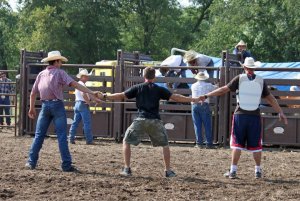 David and Jonathan were tied together through battle (1 Samuel 19.4) When David needed a brother to fight alongside him and fight for him, he had Jonathan. Saul had tried twice to kill David already. Once by his own hand (1 Sam. 18.10-11) and another time by using the Philistines by sending David on an apparent suicide mission (1 Sam 18.24-25). The only one who had a chance to change the mind of Saul was Jonathan. Jonathan had already seen the relationships of Saul crumble. There is nothing to say that Saul wouldn’t do to Jonathan what he had already tried to do to David. Still, Jonathan stood up and “spoke well of David to Saul his father and said to him, ‘Let not the king do wrong to his servant David; he has not wronged you, and what he has done has benefited you greatly.’” (1 Sam 19.4) Men of God need others to stand and fight with them and if this verse doesn’t convince you of that, look at these passages from Paul’s last letter, 2 Timothy, and draw your own conclusions:
David and Jonathan were tied together through battle (1 Samuel 19.4) When David needed a brother to fight alongside him and fight for him, he had Jonathan. Saul had tried twice to kill David already. Once by his own hand (1 Sam. 18.10-11) and another time by using the Philistines by sending David on an apparent suicide mission (1 Sam 18.24-25). The only one who had a chance to change the mind of Saul was Jonathan. Jonathan had already seen the relationships of Saul crumble. There is nothing to say that Saul wouldn’t do to Jonathan what he had already tried to do to David. Still, Jonathan stood up and “spoke well of David to Saul his father and said to him, ‘Let not the king do wrong to his servant David; he has not wronged you, and what he has done has benefited you greatly.’” (1 Sam 19.4) Men of God need others to stand and fight with them and if this verse doesn’t convince you of that, look at these passages from Paul’s last letter, 2 Timothy, and draw your own conclusions: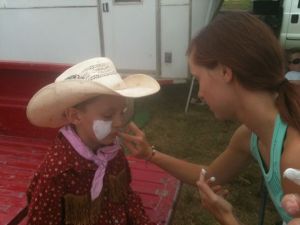
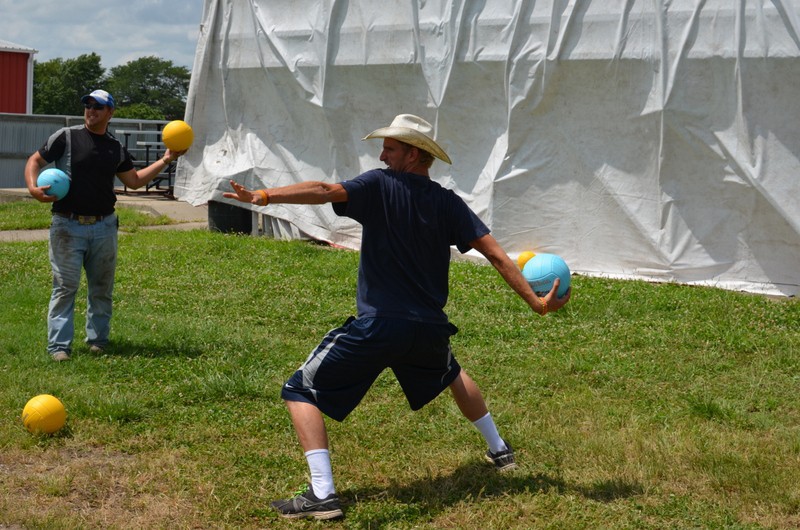 “Good judgment comes from experience, and a lot of that comes from bad judgment – Cowboy Proverb
“Good judgment comes from experience, and a lot of that comes from bad judgment – Cowboy Proverb